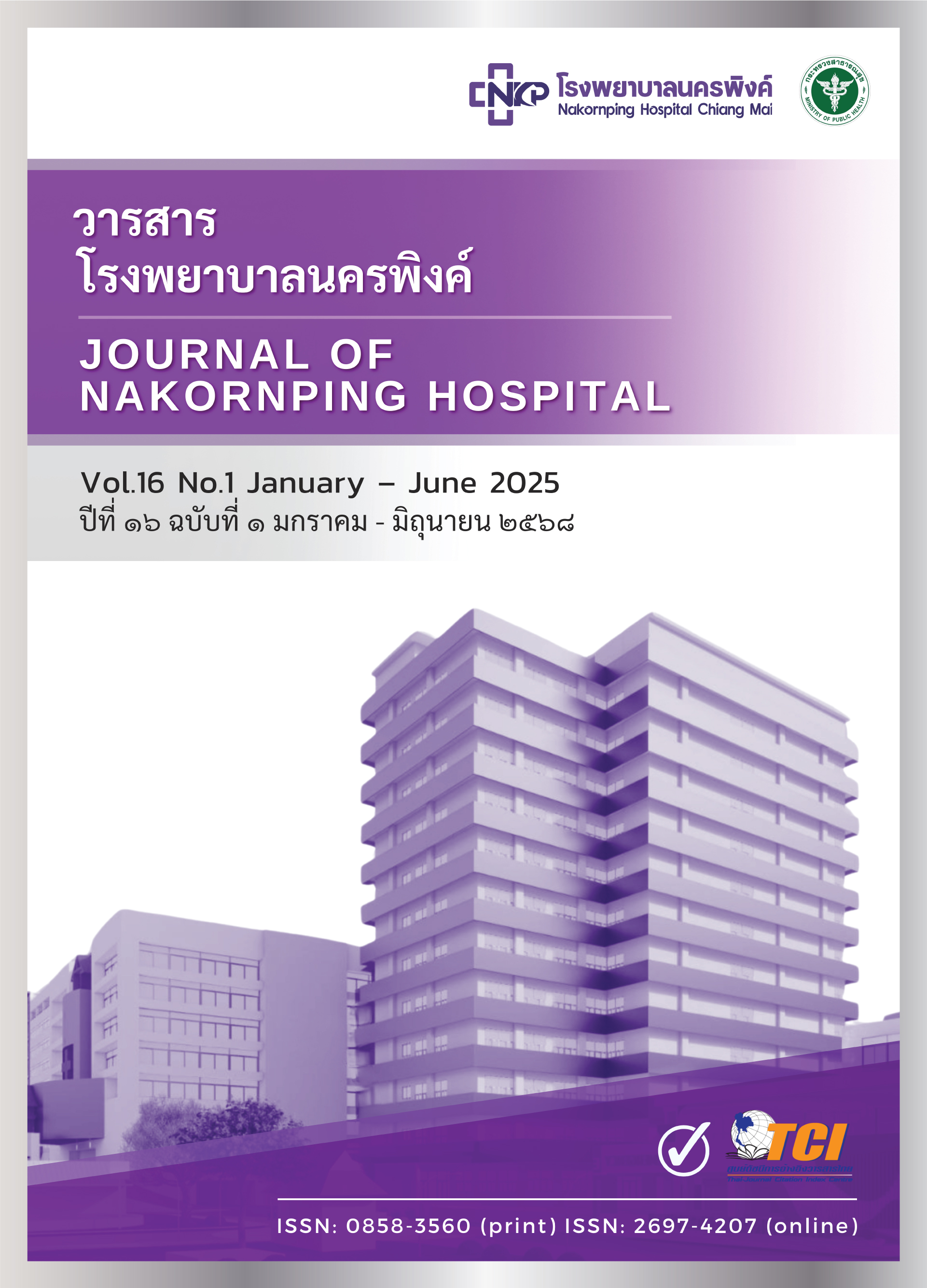Effects of self-management programs on knowledge self-management behavior and interdialytic weight gain in patients end-stage chronic kidney disease receiving hemodialysis at Nakornping hospital
Keywords:
self-management, interdialytic weight gain , end-stage chronic kidney disease, intake behaviorAbstract
Introduction: Chronic kidney disease is a global public health problem. Interdialytic weight gain is common in patients with end-stage chronic kidney disease undergoing kidney replacement therapy through hemodialysis. Therefore, good patient self-management is an important part.
Objective: To study the effects of self-management programs on knowledge self-management behavior and interdialytic weight gain in patients end-stage chronic kidney disease receiving hemodialysis.
Study Method: This quasi-experimental research aimed to study a self-management program to control interdialytic weight gain in patients end-stage chronic kidney disease receiving hemodialysis. The study was conducted between December 1, 2023 and January 31, 2024 at the hemodialysis unit, Nakornping Hospital. The sample consisted of patients end-stage chronic kidney disease receiving hemodialysis. The purposive sampling of 21 people was selected. Data were analyzed using statistics of numbers, percentages, means, and standard deviations. Compare knowledge to control interdialytic weight gain, food and water consumption behavior and daily body weight loss before and after the experiment. A paired samples t-test was employed to analyze the statistical significance of these comparisons.
Results: The total of 21 participants had an average age of 64.67 ± 12.93 years, with 61.90% being male. Hypertension was a comorbidity in 48.38% of the participants. A majority (57.10%) had been undergoing hemodialysis for 1–5 years, and 66.70% had hemodialysis sessions twice per week. Post-program assessments revealed significant improvements in knowledge about fluid overload management, with the mean score increasing from 19.09 ± 4.73 to 22.62 ± 1.86 (p = 0.001). Dietary and fluid intake behavior scores improved from 51.38 ± 6.05 to 58.24 ± 6.22 (p = 0.001). Additionally, average daily weight reduction decreased from 3.66 ± 1.49 to 2.23 ± 0.94 kg (p < 0.001).
Conclusions: Integrating the self-management program into their routine work enables the provision of accurate knowledge and guidance to patients, fostering an improved quality of life. Thus, promoting the program can contribute to its broader adoption in general practice.
References
Vijitsunthornkul K. Epidemiology and control measures to prevent chronic kidney disease [Internet]. Nonthaburi: Department of Disease Control; c2022 [updated 2022 Jun 25; cited 2023 October 9]. Available from: https://ddc.moph.go.th/uploads/publish/1308820220905025852.pdf [In Thai]
Department of Health, Ministry of Public Health. The Department of Health reveals that Thailand is among the top 5 countries with the highest rates of kidney disease. It is recommended to avoid 8 types of food [Internet]. c2023 [updated 2023 Mar 9; cited 2023 October 9]. Available from: https://multimedia.anamai.moph.go.th/news/090366/ [In Thai]
Department of Disease Control, Ministry of Public Health. Communicate risks and report health behaviors [internet]. 2023 [cited 2023 October 9]. Available from: https://ddc.moph.go.th/brc/new [In Thai]
The Nephrology Society of Thailand, Karunruk Palliative Care center, The Nephrology Nurses Association of Thailand, Kidney Health Service Development Committee, Thai Dietetic Association, Kidney Friends Association of Thailand. Kidney Supportive and Palliative Cares 2023 [Internet]. Bangkok: The Nephrology Society of Thailand; c2023 [update 2023 Jun; cited 2023 October 20]. Available from: https://www.nephrothai.org/wp-content/uploads/2023/06/e-BOOK-palliative-care.pdf [In Thai]
Planning and Information Department, Nakornping Hospital. Annual patient statistics report at Nakornping Hospital. Chiang Mai: Nakornping Hospital; 2023. [In Thai]
Putthiphol T, Leethong-in M. Development of a Self- Management Program on Volume Overload Control Behaviors among Caregivers and Older Persons with Chronic Kidney Disease Undergoing Hemodialysis : A Pilot. National Graduate Research Conference Research number 20; 2019 Mar 15; Khon Kaen University. Khon Kaen: Khon Kaen University; 2019. [In Thai]
Rungprai T. The effect of individual and family self-management program on volume overload in older persons with chronic kidney disease undergoing hemodialysis [dissertation]. Bangkok: Chulalongkorn University; 2017. [In Thai]
Poolma S. Study of self-management programs regarding water and food consumption in patients with chronic kidney failure. Complete research report, Lampang Hospital. 2018. [In Thai]
Havas K, Bonner A, Douglas C. Self-management support for people with chronic kidney disease: Patient perspectives. J Ren Care. 2016;42(1):7-14. doi: 10.1111/jorc.12140.
Kanfer FH, Gaelick-BL. Self management methods. In: Kanfer FH, Goldstein AP, Editor. Helping people change: A textbook of methods. New York: PergamonPress; 1991.
Faul F, Erdfelder E, Lang AG, Buchner A. G*Power 3: a flexible statistical power analysis program for the social, behavioral, and biomedical sciences. Behav Res Methods. 2007;39(2):175-91. doi: 10.3758/bf03193146.
Cohen J. Statistical power analysis for the behavioral sciences. 2nd ed. New Jersey: Lawrence Erlbaum Associates; 1988.
Sittiwang S. Effects of Self-management Promoting Program on Health Behaviors and Blood Pressure Level of Persons with Uncontrolled Hypertension Author [dissertation]. Chiang Mai: Chiang Mai University; 2017. [In Thai]
KanKarn W, Damnok K, Anutrakulchai S. Effectiveness of Care Model for Chronic Kidney Disease Patients Using Integrated Disease Management and Case Management in Primary Care Units, Northeast. Journal of Nursing and Health Care. 2019;37(3):173-82. [In Thai]
Lee MC, Wu SV, Hsieh NC, Tsai JM. Self-Management Programs on eGFR, Depression, and Quality of Life among Patients with Chronic Kidney Disease: A Meta-Analysis. Asian Nurs Res (Korean Soc Nurs Sci). 2016;10(4):255-62. doi: 10.1016/j.anr.2016.04.002.
Downloads
Published
How to Cite
Issue
Section
License
Copyright (c) 2025 Nakornping Hospital

This work is licensed under a Creative Commons Attribution-NonCommercial-NoDerivatives 4.0 International License.
The articles that had been published in the journal is copyright of Journal of Nakornping hospital, Chiang Mai.
Contents and comments in the articles in Journal of Nakornping hospital are at owner’s responsibilities that editor team may not totally agree with.



